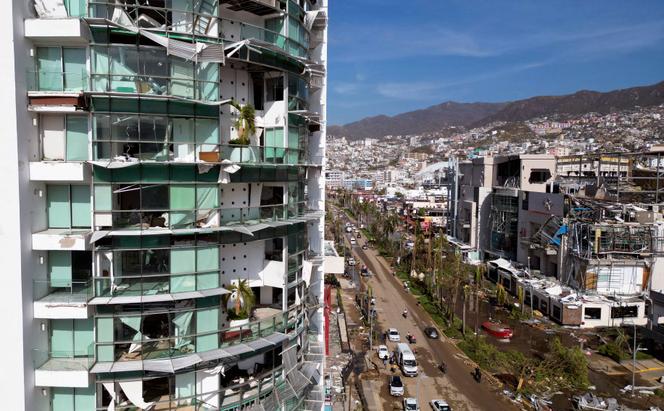

When Hurricane Otis swept through Acapulco, on Mexico's Pacific coast, on the night of Tuesday, October 24, everything seemed to have been blown away: cars, sailboats, electricity poles, roofs and trees. Footage filmed by tourists show this resort destination of almost 1 million inhabitants devastated by the force of the wind, which reportedly reached gusts of 310 km/h. Jorge Laurel Gonzalez, president of the Acapulco Association of Hotels and Tourist Enterprises, told the Mexican newspaper El Universal that the hurricane had caused unprecedented damage: "Acapulco's 20,000 hotel rooms are inoperable, and will be for a long time. I've never seen such a storm."
According to an initial assessment by the mayor's office on Thursday, 80% of the hotels were destroyed, which suggests a devastating impact on the economy of the city, in one of Mexico's poorest states. On the seafront boulevard, Acapulco's famous Malecon, the palm trees were all on the ground, and most of the restaurants no longer had roofs. On Thursday, there was little information on the destruction in Acapulco's poor outlying neighborhoods, where the hotel workforce lives. A total of 58 high-voltage pylons were down, and electricity was still not restored by Thursday evening.
As for the rural areas and the rest of the Pacific coast of the state of Guerrero, information is even more scattered, while the Papagayo River has burst its banks in several places, raising fears of the submergence of houses built along its banks. Secretary for Security and Citizen Protection Rosa Icela Rodriguez was unable to give an initial assessment until Thursday morning, during the daily press conference of President Andres Manuel Lopez Obrador, known as AMLO: 27 dead and four missing so far. The governor of Guerrero state, Evelyn Salgado Pineda, added that the death toll was likely to rise, although she did not yet have any information from most of the coastal villages.

On Wednesday, journalist Sandra Romandie was at the Pierre Mundo Imperial, a hotel just across the Pacific Ocean to attend the International Mining Convention that Salgado Pineda was due to inaugurate: "She never showed up, which surprised us all. Around 4 pm, we learned on social media that the tropical storm was about to become a hurricane, but we weren't alerted to how dangerous it was."
Along with other participants in the event, Romandie had to take refuge in one of the hotel's lounges on the first floor, as the windows and ceilings of the rooms shattered. "The wind was so strong it hurt my ears. Above all, the doors kept threatening to open. We spent over an hour barricading them with furniture and then trying to keep them closed with the strength of our arms. Today, I don't understand why this convention wasn't canceled in anticipation of such a violent hurricane," said Romandie, reached by telephone.
You have 50% of this article left to read. The rest is for subscribers only.
